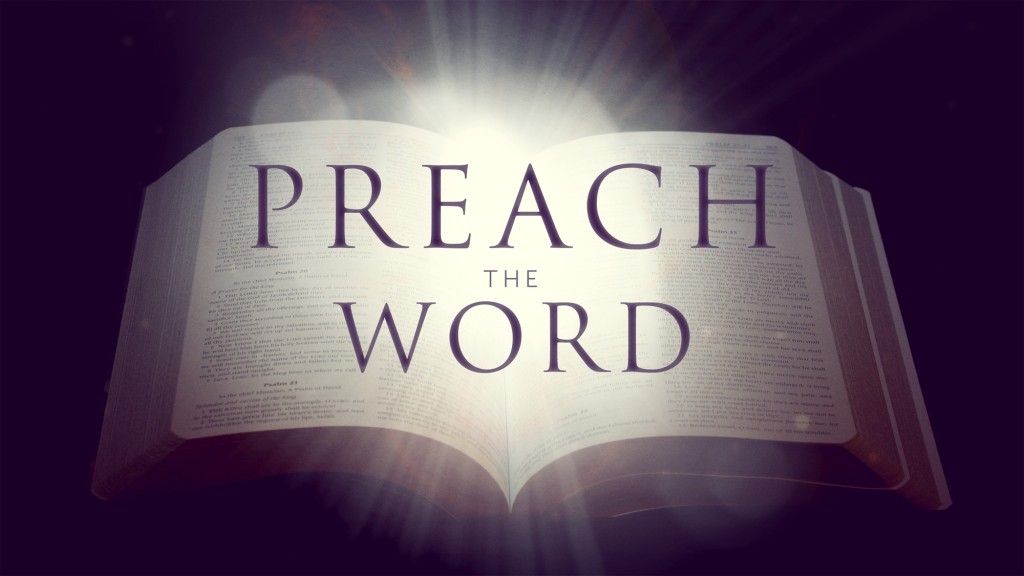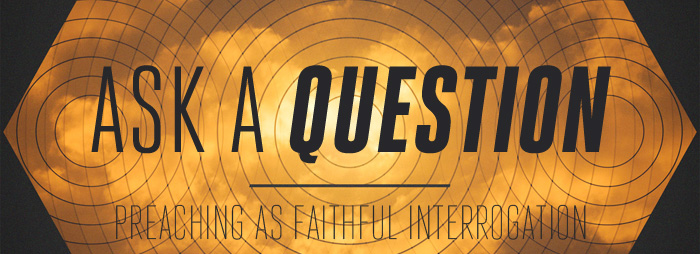I see now that preaching once on a Sabbath may work God’s purpose as well as if I preached from morning to night. For, if God speaks from heaven once, and for only a minute, yet that voice should be felt in the parish all the week, yea, for months after. – Andrew Bonar
Category Archives: Preaching
In Need of a Good Commentary?
We just wrapped up a ten-month series in Mark and will soon move on, Lord willing, to a study of Job. And so I find myself in a grand stage of sermon prep when hefty shipments of commentaries land on the doorstep.
Nothing shakes the book budget like starting a new sermon series, for good commentaries are no cheap addition to one’s library. Discerning which resources are worth the cash money can be difficult for preachers young and old. Thus, it is always good to have a few friends on speed dial when deciding on which commentaries to purchase. Here are a few companions I have found most helpful:
COMMENTING ON COMMENTARIES
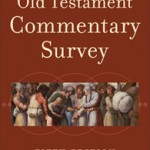 Old Testament Commentary Survey by Tremper Longman. Even though Longman has, in the past decade, gone too far in questioning things like the historicity of Adam his survey of OT resources is still quite useful. The publisher says, “The fifth edition has been updated to assess the most recently published commentaries, providing evaluative comments. Longman lists a number of works available for each book of the Old Testament, gives a brief indication of their emphases and viewpoints, and evaluates them.”
Old Testament Commentary Survey by Tremper Longman. Even though Longman has, in the past decade, gone too far in questioning things like the historicity of Adam his survey of OT resources is still quite useful. The publisher says, “The fifth edition has been updated to assess the most recently published commentaries, providing evaluative comments. Longman lists a number of works available for each book of the Old Testament, gives a brief indication of their emphases and viewpoints, and evaluates them.”
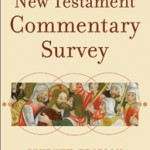 New Testament Commentary Survey by D.A. Carson. Carson’s survey is an absolute must have for every pastor. Exactly how the man continues to publish individual works, teach, preach, and still stay up to date on the most recent works published on each NT book is beyond me. The man is, flat out, a gospel-drenched machine. If you are soon to preach a series on any New Testament book, buy Carson’s survey before you purchase anything else.
New Testament Commentary Survey by D.A. Carson. Carson’s survey is an absolute must have for every pastor. Exactly how the man continues to publish individual works, teach, preach, and still stay up to date on the most recent works published on each NT book is beyond me. The man is, flat out, a gospel-drenched machine. If you are soon to preach a series on any New Testament book, buy Carson’s survey before you purchase anything else.
Keith Mathison’s Top 5 Commentaries on Every Book of the Bible. Mathison is academic dean and professor of systematic theology at Reformation Bible College. He is author of many books, including From Age to Age: The Unfolding of Biblical Eschatology and a personal favorite on the Lord’s Supper entitled, Given for You: Reclaiming Calvin’s Doctrine of the Lord’s Supper. A few years ago he started a series of posts over at Ligonier on the top five commentaries on particular books of the Bible and I find myself rarely disagreeing with his assessments. If you are looking for quick hit, trustworthy recommendations Mathison is a fantastic friend to consult.
Challies’ Best Commentaries on Each Book of the Bible. Challies writes, “Over the past couple of years I have focused on building a collection of commentaries that will include only the best volumes on each book of the Bible. I know when I’m in way over my head, so before I began I collected every good resource I could find that rated and reviewed commentaries. I studied them and then began my collection on the basis of what the experts told me. Since I did all of that work, and since I continue to keep up with the project, I thought it might be helpful to share the recommendations.” His focus, admittedly, is on recent publications, but it is nonetheless helpful in synthesizing the various recommendations of conservative evangelical scholars. Very useful.
Commenting & Commentaries by Spurgeon. If you’ve never used it before, spend some time with Commenting and Commentaries for two reasons: 1) Spurgeon will point you to valuable and lesser known commentaries from centuries gone by, and 2) his remarks are pointing and often funny. Consider what he says about Caryl’s infamous work on Job, “Caryl must have inherited the patience of Job to have completed his stupendous task (it took Caryl over twenty years to get through the book). It would be a mistake to suppose that he is at all prolix or redundant; he is only full. In the course of his expounding he has illustrated a very large portion of the whole Bible with great clearness and power. He is deeply devotional and spiritual. He gives us much, but none too much. His work can scarcely be superseded or surpassed.”
Saying Goodbye
Over the weekend I said goodbye to a friend with which I had become unusually close named Mark. The gospel of Mark that is.
For 315 days his account of Jesus’ life and ministry occupied my thinking in all manner of ways. Sometimes I could have exploded in joy at the discoveries of Mark’s unique portrayal of Christ. Other times I nearly cried out in frustration, wanting the earliest gospel writer to give me more on a particular topic. But overall, I have deep gratitude for Mark. What clarity he gives us about Christ! Is there anything more valuable in a friendship?
In eighteen months of church planting we have preached through 1 Timothy, Ruth, Haggai, and Mark. Yet, for some reason saying goodbye to Mark has affected me in ways I couldn’t put into words.
Until yesterday.
EXPOSITION AS THE MINISTRY OF ETERNITY
On the way home from picking my wife up at the airport1 I realized just what was pricking my soul: I probably will never preach on Mark again. Sure, I may preach a sermon here or there on a particular passage, but I would be quite surprised if I walk through the whole book again. The finality of it all is quite saddening, but oh so useful.
For I have uncovered what is, at least for me, yet another benefit of systematic exposition: it is a powerful reminder of death. Realizing that you may never preach through the book again, never get a chance to do it over and improve it, helps a man learn to number his days and get a heart of wisdom (Ps. 90:12). It helps the preacher minister God’s eternal word with the weight of eternity on his heart. Such a lesson couldn’t have been learned anywhere else than befriending God’s word.
Mark has been a wonderful friend. If you haven’t gotten to know him well, I commend him to you with the highest regards. He will teach, warn, and encourage you in unexpectedly glorious ways.
—————————————————————————————————————
- She spent the weekend at TGC’s National Women’s Conference. ↩
Experience and Preaching
Last year I said one of the most difficult distinctions in preaching is the one between preaching among the congregation not just at the congregation. Earlier this month I offered up another vital nuance: preaching in the text not merely about the text.
Today I want to highlight another one. You gotta love precision.
The Framian perspectivalists might smell something here, but rest assured I have no intention of turning these distinctions into some homiletical triad. If you can do it, I’m all ears.
Here then is the distinction I want to briefly consider today: preaching from your experience versus preaching about your experience.
DANGER LURKS AROUND THE CORNER
A tweet by Piper actually stirred up my thinking on this issue. He wrote,
Amen. Nothing will teach a man to preach like the experience of cross-bearing. Sorrows will bend and break the preacher in ways no techniques of homiletics can. Lord willing, those formations of experience create Christlike pulpiteers.
But we need to recognize that experience is a dangerous thing when it comes to preaching. In an evangelical culture that craves authenticity, preachers will be tempted to include many personal anecdotes to connect with a congregation. Over and over, we are told, “You must be transparent. Transparency moves.” And they are right, it does move! Yet, we are preachers of the word, not self. Too many personal illustrations will lead a discerning hearer to say, “It seemed like there was more of Preacher in that sermon than Jesus.”
One of my favorite preachers growing up, who is still extremely popular, often gave sermons which felt like “The Story Factory.” His strength of illustration was, and is, astounding. To his credit, every illustration clearly illuminated biblical truth. However, as I matured what I craved was not hearing his personal experiences, but hearing a word-saturated sermon empowered by cross-shaped experience.
We need pastors who preach from their experience not just about their experience.
HUMBLE EXPERIENTIAL PREACHING
Here’s what I am trying to get at. Faithful preachers are obedient preachers. Obedient preachers are those who take up their cross and follow Christ. Such men will inevitably face hardship, pain, and suffering in the ministry. We need to let those trials function as something like sermonic seasoning. Open up a faithful preacher’s Homiletical Pantry and what should we find? Holy spices named Humility, Tenderness, Earnestness, and Reverence. Those qualities ordinarily come through Spirit-wrought experience and flavor the sermon with tasty holiness. And that, to update Mr. M’Cheyne, is what my people need most.
So how exactly does God’s mortal and pestle grind out godly sermons? Consider these examples:
- We have seen the ghastly stain of sin that still mars our heart. So when we preach on sin we do so from experiential humility.
- We have seen infants die and cancer afflict too many bodies. So when we preach on suffering we do so from experiential tenderness.
- We have seen friends and family, whom we’ve loved, dilly dally with the things of God and His gospel. So when we we call sinners to faith and repentance we do so from experiential earnestness.
- We have seen, through study, the blinding holy-love of God and the preciousness of His truth. So when we preach His word we do so from experiential reverence.
Preacher, don’t fall into the modern morass calling for sermons saturated with stories of your experience. Sprinkle them in when its wise. What’s best is saturating your sermons with the truth of God’s word falling from a soul shaped by the cross. Preach from your experience rather than about your experience.
The Interrogation Room
It’s not uncommon today to find people, Christians even, who view the preaching event as a mere monologue. But faithful preaching is far from a banal harangue.
In his masterful book Between Two Worlds John Stott advocates a “silent dialogue” in preaching. He writes,
[In every sermon a] silent dialogue should be developing between the preacher and his hearers. For what he says provokes questions in their minds which he then proceeds to answer. His answer raises further questions, to which he again replies. One of the greatest gifts a preacher needs is such a sensitive understanding of people and their problems that he can anticipate their reactions to each part of his sermon and respond to them. . . . We want to provoke people to think, to answer us and argue with us in their minds, and we should maintain such a lively (though silent) dialogue with them that they find it impossible to fall asleep.
Amen. A proper “silent dialogue,” in its most basic form, anticipates the audiences struggles with the text and offers clarity from the text.
But let me take the silent dialogue further in order to ramp up the congregational conversation.
INTERROGATION, INTERROGATION
Maybe it’s because I read too many detective novels or grew up watching too many detective novels, but I love a good interrogation. I appreciate an interrogation scene with such masterful attention to nuance that falsehoods unravel in an instant. Or clarity cuts through the cloud with precision.
Faithful preachers will give such attention to nuance in pursuit of clarity as they preach. We do this by asking our congregation questions. Rhetorical, interrogative questions engage the hearer’s heart and mind, amplifying the silent dialogue, and saving Eutychus.
It’s not uncommon for me to listen to a dozen or so sermons throughout the week, from outstanding preachers no less, and the use of the interrogative seems to be heading the way of the saber-toothed tiger. In other words, it’s vanishing.
But let me offer a small attempt to save the species from extinction.
HONING YOUR QUESTIONING SKILLS
It could be that those expert preachers I listen to are, well, expert in their delivery. So forceful and attractive are their expositional skills that they need not pursue the silent dialogue to keep attention. But we lesser men need to use all the tools at our disposal and thus need to sharpen our interrogation skills.
In every text we have an abundance of opportunities to question our congregation. Sometimes those questions address objections, other times it points to common shortfalls in understanding, or they point the hearer to faithful application of the truth.
Here are a few examples, from recent sermons, of how I tried to engage my congregation in silent dialogue via interrogation:
- After reading about Jesus’ silence before Pilate I asked that age old, elementary question of, “Why?” Saying, “Why did Jesus not open His mouth?”
- When meditating on Jesus’ silence in the face of false accusation (Mark 15:5) I asked, “When was the last time your were falsely accused? What was your immediate reaction?”
- When showing how the crowd in Mark 15:12-15 call for the release of Barabbas instead of Jesus I asked, “Every day the enemy of mankind and Lord of mankind call you to follow, whom will you choose? False saviors that make promises they never can fulfill, or the Savior who Himself is the greatest promise?”
- When talking about the people’s ironic mockeries thrown at Jesus while he was on the cross (Mark 15:26-23) I asked, “Do you see here how the human heart can stand right in the face of truth and yet utterly miss the truth? Could the truth of Christ possibly be staring at you in the face tonight and yet you still miss it?”
- When explaining how the wrath of God fell on Jesus to such a degree that the land went dark for three hours (Mark 15:33) I asked, “What do you think about this wrath of God? Is it an attribute to be announced and amplified? Or minimized and muted?”
- This week I, Lord willing, will preach on Joseph of Arimathea and his burial of Jesus. After explaining who Joseph was from Mark 15:42-44 I hope to say, “I wonder if any of you are quite like Joseph. Are you settled in your faith, but somewhat secret with it?”
A TOOL NOT TO BE UNDERESTIMATED
Interrogation is one of the most basic parts of human conversation. From their earliest ability to speak children ask their parents, “Why?” We preachers need to seize on this ordinarily element of humanity and employ it unto congregational engagement.
When you ascend to the sacred desk this week, reverently think about it as though you have come to the interrogation room. Question them, poke, prod, and uncover their soul so they might discover the glorious of Christ.
Reading for Preaching
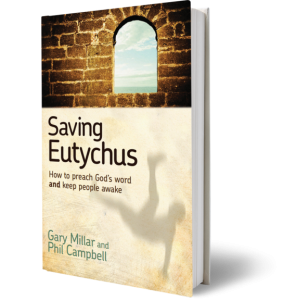 I’ve heard many preachers offer some variation on this comment, “Don’t read books on preaching, just listen to good preaching.”
I’ve heard many preachers offer some variation on this comment, “Don’t read books on preaching, just listen to good preaching.”
And that’s sound advice for sure. Because certain aspects of good preaching can be taught, but so much of it is caught. Thus, the best thing young and aspiring preachers can do is regularly sit under sound preaching. This is even one reason why pastors ought not fill the pulpit every single week, for they too need to sit and be sharpened. Listening to podcasts or mp3s is all fine and dandy, but it is still no replacement for the visual event of preaching.
YET, ONE COMES ALONG WORTH READING
Every once in a while, however, a book comes along on the topic of preaching and it falls into the “must read” category. For me, those books usually are not methodologies of preaching nor theologies of preaching1, they are better categorizes as “experiences of preaching.” These books come from seasoned pastors who have the correct principles of preaching in place, but the bulk of the work offers up practices for consideration. How do you prepare a sermon? Structure a sermon? Deal with discouragement in preaching?
One recent book worthy of any preacher’s attention is Gary Millar and Phil Campbell’s Saving Eutychus: How to Preach God’s Word and Keep People Awake.
As a rule of thumb, if D.A. Carson endorses a book, you need to pay attention. His recommendations are few and thoughtful. Consider what he says about Saving Eutychus:
I have read books on how to make sure your sermon is interesting, and I have read books on how to make sure your sermon is faithful to the text, but this book wants your sermon to be both. If I could, I would make this little book mandatory reading for seminarians everywhere, and then urge them to read it a couple more times during the course of their ministry. It avoids cutesy and manipulative suggestions, and makes its practical points while urging integrity, faithfulness, and imagination. Many books on preaching are published every year; this one is a ‘must.’
PUT IT INTO YOUR SHOPPING CART
Filled with humor and immediately employable wisdom, I can’t see how any preacher wouldn’t benefit greatly from this book. I found it so compelling and challenging that my prayers before preaching regularly include a petition that God would “save Eutychus.” We need more preaching books like this one.
If you haven’t read it yet, make sure to buy a copy today.
- Yet, such books are valuable. Click here to see my post “3 Books Every Pastor Should Read: On Preaching.” ↩
Sermon Preparation as Thanksgiving
Pastor, have you ever thought of sermon preparation as a weekly Thanksgiving holiday? Let’s just briefly consider how the work of sermon prep is high octane fuel for gratitude.
OCCASIONS FOR THANKSGIVING
If you get illumination into the text’s truth – give thanks.
If you receive heart-searching application to give to your congregation – give thanks.
If you understand how your text organically points to Christ – give thanks.
If you gain a deeper understanding of God’s character – give thanks.
If you have a sermonic structure that’s memorable and persuasive – give thanks.
If you see how your text uniquely heralds the gospel to an unbeliever – give thanks.
If your affections for God’s glory in Christ increase through the preparation – give thanks.
If your heart is moved to confess sin in light of your text – give thanks.
If you gain helpful illustrations or metaphors to adorn the passage – give thanks.
We could go on and on. If we see sermon preparation as a powerful means of grace, what type of people ought we pastors to be but those “always abounding in thanksgiving?”
We are often for preaching to awaken others; but we should be more concerned with prayer. Prayer is more powerful than preaching. It is prayer that gives preaching all its power. . . . Prayer must be added to preaching, else preaching is in vain. . . . O believing brethren, what an instrument is this which God hath put into your hands! Prayer moves him that moves the universe. – Robert Murray M’Cheyne
See the Sermon’s Authority
In his inaugural sermon at Bethlehem Baptist Church John Piper said he longed for a particular sound to mark the congregation.
If I could choose a symbolic sound that Bethlehem Baptist Church would come to be known for, you know what it would be? The swish of the pages of 500 Bibles turning simultaneously to the morning and evening texts.
When was the last time you heard such swishing of pages in a church service? I bet it’s been a l o n g time. The ubiquitous use of smart phones and tablets has relegated the printed Bible to a minority in corporate worship. And that’s ok. Piper would even agree.
We would do well, however, to remember why he wanted to hear the sound in the first place:
The reason [why I want the sound of swishing pages is this]: the source of my authority in this pulpit is not—as we shall soon see—my wisdom; nor is it a private revelation granted to me beyond the revelation of Scripture. My words have authority only insofar as they are the repetition, unfolding and proper application of the words of Scripture. I have authority only when I stand under authority. And our corporate symbol of that truth is the sound of your Bibles opening to the text.
Yes and amen. It’s all about authority.
But if symphonic rustling of pages belongs to an era gone by is there any contemporary replacement? Is there anything we ought to long for as a sign of where our authority in preaching lies?
HOLY BOBBLE HEADS
I would argue the best congregational sign of preacher rooted in biblical authority is in the sighting of what I like to call “holy bobble heads.” I want to see a congregation look up at the preacher and then look down at the text, look up at the preacher and then look down at the text.
It is a terrible experience to sit in the congregation and listen to the preacher’s rhetoric for twenty minutes before he summons you to look at the particular passage he is supposed to exposit. What he doesn’t realize is that, in all likelihood, he has just implicitly stated his authority lies in his rhetoric more than the theopneustos Scripture.
No, dear preacher, read your text at the beginning and never let long go by before you tell your people, “Look at verse . . .,” “Notice what happens next in . . .,” or, “See how he concludes the argument in verse . . .” Your authority is in that Holy Book, so tell them – frequently – to look down at The Book.
In his recent book Taking God At His Word Kevin DeYoung notes how the sanctified bouncing of heads is Berean movement:
When I speak at different conferences and churches, I’m often surprised how few people bother to look at their Bibles when I’m speaking. Be it laziness, forgetfulness, or something else, it’s not a good habit. I have no authority in myself. I don’t want people to just take my word for it. God’s people should be testing everything against God’s word. Whether we are the ones teaching or listening, we need to have our Bibles open like the Bereans. (75)
Preacher, you can help them be like the Bereans with consistently pointing their eyes back to your passage.
PREACHING IN AND NOT ABOUT
I’ve said before that in the delivery of preaching there is a great difference between preaching at the sheep and preaching among the sheep. Don’t you love distinctions? When done wisely they are like flint for our sermon swords. There is another distinction which lays at the heart of this issue of rooting your preaching in the authority of God’s word: we must preach in the text, not merely about the text.
You likely have experienced the distinction before. One sermon proposes to expound a passage of Scripture and says many true things about the text, but one leaves feeling the preacher invited the congregation on a holy float across the sea of Scripture. There are things surely worse than floating. Many contemporary preachers are content to sit on the sands far removed from the biblical waters. But we can and must do better than a leisurely float. We must summon our congregation through the sermon to a high-pressure, deep dive in the waters of God’s truth.
We herald the matters of life and death; so it is indeed a high-pressure endeavor. And it must also be deep. Jesus washes His church in His word by having His preachers soak their sermons in His word. Descend down to the depths of truth each week. So tell them to look down there with you!
Preach in the text, not merely about the text.
Help your people become holy bobble heads.
Give them the rich portions of His word.
And summon them to see it.
May It Be So of Us
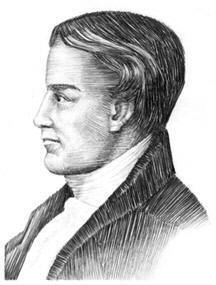 Robert Murray M’Cheyne’s holy life was legendary in his century. Spurgeon counted him among the “best and holiest men,” and good Bishop Ryle listed him as one of the “holiest men of modern times.”
Robert Murray M’Cheyne’s holy life was legendary in his century. Spurgeon counted him among the “best and holiest men,” and good Bishop Ryle listed him as one of the “holiest men of modern times.”
His holiness had a direct effect on the power of his preaching. John Shearer points this out in his work Old Time Revivals by saying,
M’Cheyne was himself his greatest sermon, and here is the secret of his success. He walked with God in the beauty of holiness. Our Lord’s presence seemed to envelop him, diffusing a holy aroma. His very manner, his bearing as if a man standing in God’s presence, was often the means of awakening indifferent sinners, so that men who could not remember a word he said found themselves with an unforgettable impression that God had drawn very near to them. – Quoted in Beaty, An All-Surpassing Fellowship, 27-28.
Pastor, pray and labor for this kind of holiness. May you shine and burn in the adornment of godliness when you ascend to the sacred desk this weekend.


